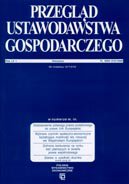Przegląd Ustawodawstwa Gospodarczego nr 05/2010
Miejsce wydania: 2010 Warszawa
Oprawa: miękka
W numerze:
Marcin Olszak
Prawne przygotowanie do przyjęcia euro przez Polskę – zarys problemu
Legal preparation to adoption of the euro in Poland – outline of the problem
Republic of Poland has the status of Member State with a derogation according to Article 139 of the Treaty on the functioning of the European Union (“the TFEU”). Abrogation of the derogation by Council depends on the fulfillment, among others, of legal convergence criteria by each Member States, involving Poland (in accordance with Article 140 (1) of the TFEU). Such criteria refer to the compatibility of the national legislation of each of these Member States, including the statutes of its national central bank, with Articles 130 and 131 of the TFEU and the Statute of the ESCB and of the ECB. However, efficient introduction of the euro in the Republic of Poland requires that changes in Polish legal system not directly connected with the fulfillment of the criteria mentioned above are implemented. The Author concludes that the legal preparation should be concentrated on two issues, namely: ensuring that Polish legislation, in particular Polish Constitution and the Act on the National Bank of Poland of 29 August 1997, is compatible with the TFEU and the Statute of the ESCB and of the ECB, and introducing regulations that concern the adoption of the euro directly.
Rafał Blicharz, Michał Kania
Klauzula interesu publicznego w publicznym prawie gospodarczym
Public interest as a clause in public economy law
The article shows different ways of understanding clause of public interest in Polish law, especially from point of view of public economy law. The topic was composed on two parts: theoretical (doctrinal) and exemptional. The second part was based on capital market law and public and private cooperation regulations. In the beginning Authors gave a picture of their own way of understanding the clause. Suggested idea seems to be very attractive, since Authors try to prove the clause may be objectively understand, what means, that no matter of circumstances of the case, the clause of public interest is always understand in the same way. Authors support their opinion on the purpose of the clause which is in their picture to balance interests of different parts of a state (local or global) society. They found and give many exemplas to support their point of view.
Katarzyna Gębala
Charakter prawny aktu wyboru beneficjenta pomocy w celu ratowania lub restrukturyzacji udzielanej przez Agencję Rozwoju Przemysłu S.A. i Ministra Skarbu Państwa w ramach środków z Funduszu Restrukturyzacji Przedsiębiorców
Legal function of a decision regarding a choice of the beneficiary of public aid aiming at saving or restructuring of such beneficiary granted by the Industrial Development Agency and the Ministry of Treasury from the resources of the Fund for Restructuring of Enterprises
This article concerns the problem of a legal function of a decision regarding choice of the beneficiary of public aid aiming at saving or restructuring of such beneficiary granted by the Industrial Development Agency and the Ministry of Treasury from the resources of the Fund for Restructuring of Enterprises. The issue regarding the administrative proceeding commenced by a motion and the legal function of the decision concerning a choice of the beneficiary issued during such proceeding may raise several doubts. This is because there are no commentaries whatsoever regarding this matter since it has not been a subject to any analysis of legal academics nor it has been even marginally referred to in any other way for example in the decisions of administrative courts. The purpose of this analysis is to decide whether the resolution of the management board of IDA and the decision of the Minister of Treasury constitute administrative decisions. The author concludes that, although the names are different, the resolution of the management board of IDE and the decision of the Minister of Treasury – constitute indeed the same legal act, namely an administrative decision. Therefore, they create the same legal rights of entrepreneurs, in particular a possibility of questioning and challenging them and bringing actions to an administrative court.
Konsultacje
Dorota Fleszer
Niekomercyjna działalność gospodarcza gminy
The economic activity of the Polish local government
The economic activity of the Polish local government (gmina) is not aimed to bring a profit. Its aim is to perform public tasks i.e. its individual tasks thus satisfying the collective needs of the local community. This means that the basis for its operation has be sought in the legislation defining the tasks of a local government. However, being broadly and imprecisely defined, it is a source of difficulties in establishing the acceptability of performing specific business activities. Conducting economic activity by gmina directly involves forming companies i.e. organisational units that are established in order to carry out such an activity.
| Inpost Paczkomaty | 14 zł |
| Kurier Inpost | 14 zł |
| Kurier FedEX | 14 zł |
| Odbiór osobisty | 0 zł |
| Darmowa dostawa | od 250 zł |
| Darmowa dostawa w Klubie Książki | od 200 zł |

